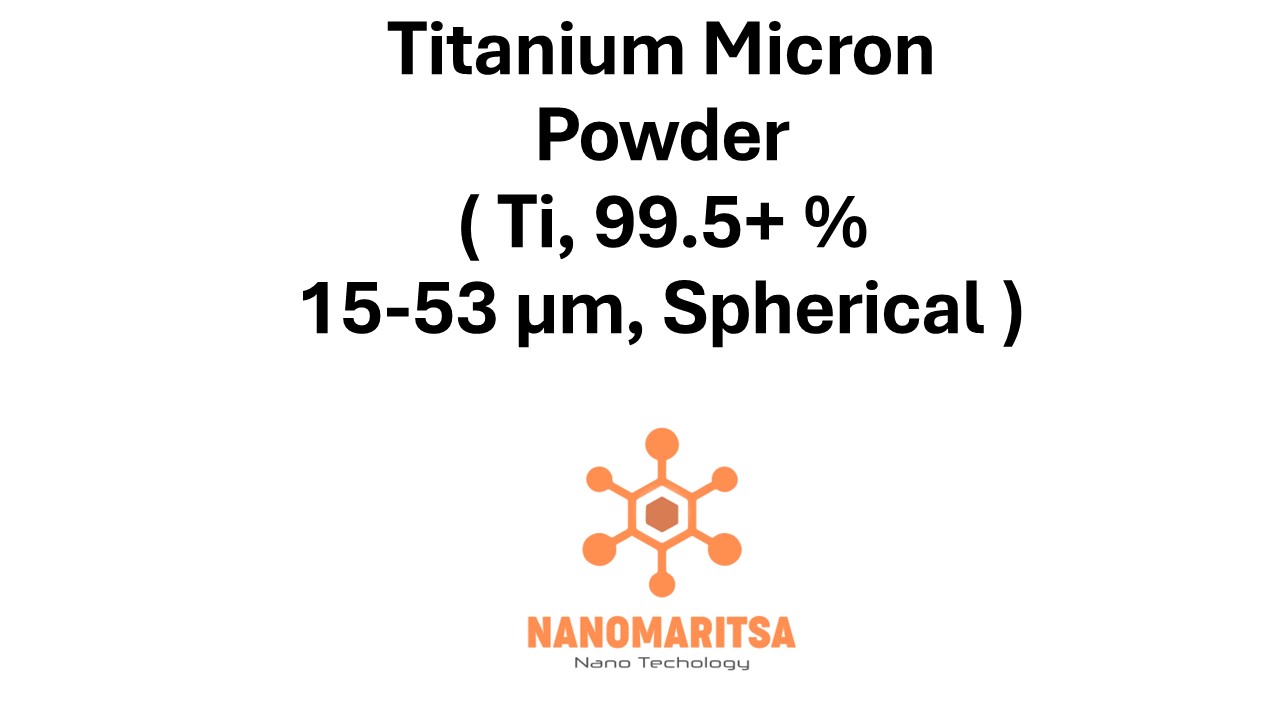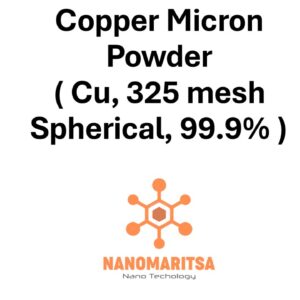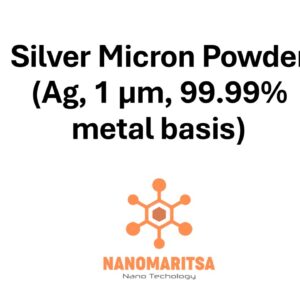Titanium Micron Powder (Ti, 99.5+%, 15–53 µm, Spherical) is a high-quality titanium powder with a purity exceeding 99.5%, characterized by a precisely controlled spherical particle shape. With a particle size distribution ranging from 15 to 53 micrometers, this powder strikes an excellent balance between flowability, packing density, and surface area—qualities that are essential for advanced manufacturing processes such as additive manufacturing (3D printing), powder metallurgy, and thermal spraying. Titanium’s well-known strength-to-weight ratio, corrosion resistance, and biocompatibility make it invaluable for industries including aerospace, automotive, and medical device manufacturing.
- Key Properties
- High Purity (≥99.5%)
The elevated purity standard minimizes impurities and contaminations, ensuring the material meets stringent requirements in high-performance applications like aerospace and medical. - Spherical Particle Shape
Round, uniform particles are integral for smooth powder flow, even layering, and consistent part density in processes like selective laser melting (SLM) or electron beam melting (EBM). - Particle Size (15–53 µm)
This size range offers an optimal compromise between surface area for bonding and flow stability, supporting repeatable results in powder-based manufacturing. - Corrosion Resistance
A thin oxide layer on titanium surfaces protects against oxidation and chemical attack, making it highly durable in harsh environments, such as marine or chemical processing. - High Strength-to-Weight Ratio
Titanium’s mechanical robustness at a relatively low density lends itself to weight-critical applications where minimizing mass is key—particularly in aerospace and automotive design. - Biocompatibility
The inert nature of titanium within the human body supports its use in implants, prosthetics, and other medical devices that demand reliable, long-term performance.
- High Purity (≥99.5%)
- Applications
- Aerospace and Automotive
Lightweight yet sturdy titanium parts reduce overall vehicle mass, improving fuel efficiency and performance. Components like engine parts, turbine blades, and structural frameworks benefit from titanium’s resilience. - Additive Manufacturing (3D Printing)
Thanks to the spherical morphology and reliable flow characteristics, this titanium powder is well-suited for powder-bed fusion technologies, enabling the production of complex, high-strength components with minimal post-processing. - Medical Devices and Implants
Biocompatible titanium powders enable the creation of patient-specific implants (e.g., orthopedic or dental), where customized geometries and surface textures can enhance fit and tissue integration. - Powder Metallurgy
Used in metal injection molding (MIM) or hot isostatic pressing (HIP), titanium powder yields near-net-shape parts with refined microstructures, reducing material waste and machining time. - Thermal Spraying and Coatings
The corrosion and wear resistance of titanium can be applied as a protective layer. Its spherical shape aids in consistent spraying, enhancing coating adhesion and uniformity.
- Aerospace and Automotive
- Advantages
- Excellent Flowability
Spherical particles mitigate the risk of clogging in feed mechanisms, ensuring uniform distribution in additive manufacturing or coating processes. - Robust Mechanical Properties
Titanium’s high tensile strength, fatigue resistance, and ductility make it a trusted choice for critical applications subject to heavy stress or variable temperatures. - Corrosion and Oxidation Resistance
Ideal for extended use in corrosive or high-temperature settings, titanium components require less maintenance and enjoy longer service lives. - Lightweight Design Benefits
Low density provides valuable weight savings in aerospace, motorsports, and other performance-driven fields, without sacrificing structural integrity. - Compatible with Advanced Processes
This titanium powder fits diverse manufacturing technologies, from traditional powder metallurgy to cutting-edge 3D printing, thanks to its purity and controlled particle size range.
- Excellent Flowability
- Recent Trends and Research
- Refinements in Powder Production
Continuous improvements in atomization and milling technologies enhance powder consistency, reducing porosity and boosting mechanical performance. - High-Volume 3D Printing
As additive manufacturing scales up in industries like aerospace and medical, the need for reproducible, high-quality titanium powder spurs innovation in powder handling and recycling. - New Alloy Developments
Research continues into titanium-based alloys with improved high-temperature performance and easier printability, aiming to broaden the scope of possible applications. - Surface Engineering
Methods like plasma spraying or laser texturing are being integrated with titanium powders to produce coatings or implants featuring optimized porosity and tailored surface properties. - Sustainability and Circular Economy
Increased focus on reclaiming and recycling titanium powder from support structures and leftover build material is helping to minimize waste and lower production costs.
- Refinements in Powder Production
- Future Prospects
- Expanding Aerospace & Defense Use
Weight reduction and reliability remain top priorities in aircraft and defense systems, favoring advanced titanium-based components for enhanced efficiency and performance. - Medical Customization
Personalized implants, patient-specific surgical instruments, and prosthetics will likely see increased adoption as 3D printing technologies become more accessible and refined. - Automotive Innovations
High-end automotive manufacturing continues to explore titanium parts that can slash weight, boost fuel efficiency, and endure extreme operating conditions. - Improved Cost-Effectiveness
Advances in powder production and recycling will lower prices, enabling more industries and smaller-scale enterprises to benefit from titanium’s unique properties. - Breakthrough Manufacturing Processes
Research into hybrid additive and subtractive technologies, as well as binder jetting, may further amplify the role of titanium powder in complex product designs.
- Expanding Aerospace & Defense Use
With a 15–53 µm particle size distribution, 99.5+% purity, and a spherical morphology, Titanium Micron Powder (Ti, 99.5+%, 15–53 µm, Spherical) delivers the flowability, reliability, and mechanical performance that modern industries require. From aerospace components to medical implants, this titanium powder is a key enabler of high-strength, lightweight, and corrosion-resistant solutions that push the boundaries of efficiency and innovation.
| Measurement (gr) | 100 grams, 500 grams, 1000 grams |
|---|






